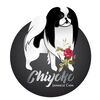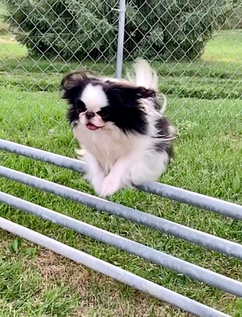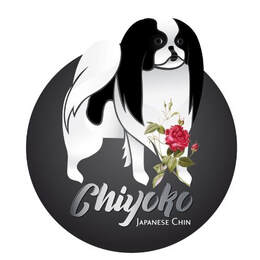|
OVERALL HEALTH
The Japanese Chin is generally a healthy little dog with a life expectancy of 10 – 12 years, or longer.
Each individual breed has specific health issues that they may be predisposed to and the Japanese Chin is not any different. Although the majority of Japanese Chin experience few significant health issues, we feel that it is imperative that breeders test their breeding stock regularly against heritable disorders. Of course this is not a guarantee that these issues will be completely eliminated but careful health testing demonstrates that breeders are actively trying to minimize health problems. |
Of the genetic hereditary disorders that we currently know Japanese Chin to be prone to, the most common are:
- Cataracts can develop at any age and can cause blindness or may grow slowly and never actually progress to blindness. Routine eye examinations by a registered ophthalmologist are highly recommended for early detection and treatment.
- Heart disease may start at an early age or not appear for several more years. Symptoms may include lethargy, sudden weight loss, coughing, shortness of breath or fatigue. Early diagnosis is essential so treatment can begin as soon as possible. Examination by a registered cardiologist is highly recommended for early detection and treatment.
- The patella (kneecap) is part of the stifle joint (knee). In patella luxation, the kneecap dislocates or moves out of its normal position. This is a common condition in dogs, especially small breeds. Animals can be affected as early as 8 weeks but usually becomes evident between the ages of 4 to 6 months. Grades 1 and 2 generally do not cause discomfort however grades 3 and 4 may require surgery.
- The term Brachycephalic Syndrome refers to the combination of elongated soft palate, stenotic nares, and everted laryngeal saccules, all of which are commonly seen in brachycephalic breeds. Some dogs with brachycephalic syndrome may also have a narrow trachea (windpipe), collapse of the larynx (the cartilages that open and close the upper airway), or paralysis of the laryngeal cartilages.
- Gangliosidosis, or GM2, is a recessive hereditary lysosomal storage disease. It is sometimes referred to as either Tay-Sachs disease or Sandhoff's disease. As it takes time for the storage material to build up enough to interfere with the brain cell’s function, dogs with Gangliosidosis are normal at first. Somewhere around a 1-1½ years of age, they become mentally dull, may not come when called or ask to go out to potty. They may develop a goose-stepping gait and have problems with their balance. Their head may shake especially when they try to eat. As the disease progresses, their coordination worsens and they become weak. Eventually, they become totally unaware of their surroundings and their quality of life deteriorates until euthanasia must be considered. A simple DNA test is used to screen for GM2.
- Cataracts can develop at any age and can cause blindness or may grow slowly and never actually progress to blindness. Routine eye examinations by a registered ophthalmologist are highly recommended for early detection and treatment.
- Heart disease may start at an early age or not appear for several more years. Symptoms may include lethargy, sudden weight loss, coughing, shortness of breath or fatigue. Early diagnosis is essential so treatment can begin as soon as possible. Examination by a registered cardiologist is highly recommended for early detection and treatment.
- The patella (kneecap) is part of the stifle joint (knee). In patella luxation, the kneecap dislocates or moves out of its normal position. This is a common condition in dogs, especially small breeds. Animals can be affected as early as 8 weeks but usually becomes evident between the ages of 4 to 6 months. Grades 1 and 2 generally do not cause discomfort however grades 3 and 4 may require surgery.
- The term Brachycephalic Syndrome refers to the combination of elongated soft palate, stenotic nares, and everted laryngeal saccules, all of which are commonly seen in brachycephalic breeds. Some dogs with brachycephalic syndrome may also have a narrow trachea (windpipe), collapse of the larynx (the cartilages that open and close the upper airway), or paralysis of the laryngeal cartilages.
- Gangliosidosis, or GM2, is a recessive hereditary lysosomal storage disease. It is sometimes referred to as either Tay-Sachs disease or Sandhoff's disease. As it takes time for the storage material to build up enough to interfere with the brain cell’s function, dogs with Gangliosidosis are normal at first. Somewhere around a 1-1½ years of age, they become mentally dull, may not come when called or ask to go out to potty. They may develop a goose-stepping gait and have problems with their balance. Their head may shake especially when they try to eat. As the disease progresses, their coordination worsens and they become weak. Eventually, they become totally unaware of their surroundings and their quality of life deteriorates until euthanasia must be considered. A simple DNA test is used to screen for GM2.


